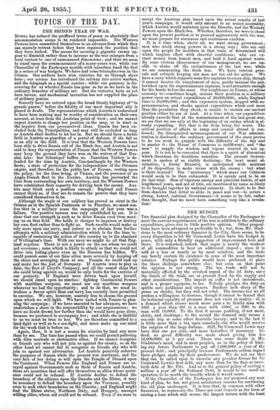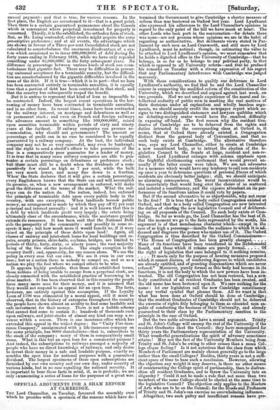THE BUDGET.
Tire financial plan designed by the Chancellor of the Exchequer to meet the current requirements of the war in addition to the ordinary expenditure gives rise to little positive opinion. Other proposi- tions have been advanced as preferable to it ; but, from Mr. Glad- stone to the most ordinary financier in the City, there seems to be every disposition to let Sir Cornewall Lewis have his budget in peace, with only a friendly suggestion of improvement here and there. It is remarked, indeed, that sugar is nearly the weakest of all commodities to bear an additional impost ; since it is sold at a loss or nearly so by most retailers, and the trade can barely sustain its existence in some of the most important colonies. Perhaps the public would have preferred to place the three shillings somewhere else ; but even on that point the opinion is not strong. The tea trade will not be materially affected by the revoked repeal of the 3d. duty, since the limits of the trade are at present fixed by the supply and other considerations. The impost on coffee is not immoderate, and is a proper equipoise to tea. Nobody grudges the dtity-on spirits save publicans and sinners. Bankers look sharp at Ste pence on checks, but they will not rebel. The income-tax we all profess a willingness to increase, though it cannot be denied that its technical equality of pressure does not exist in reality : Si. is a demand which causes much more pain a to family man with 100/. a year than 50/. to a man with 1000/. or 500/. to the man with 10,000/. To the first it means pudding, if not meat, shirts, and stockings ; to the second the demand only means a sea-side trip or some other desirable luxury; and to the last it is little more than a tax upon somebody else who would receive the surplus of the large fortune. Still, Sir Cornewall Lewis may have that one per cent, and more hereafter' if necessary. In- deed, no great difficulty was made about giving him his 16,000,000/. at 3 per cent. There was some doubt in Mr. Gladstone's mind, and in most people's, as to the policy of bind- ing any future Parliament to pay off 1,000,0001. a year of the present debt ; and principally because Parliaments seldom regard these pledges made by their predecessors. We do not see that they can be called upon to exercise any peculiar favour for Sir Cornewall Lewis's first debt, any more than for the first or twen- tieth debt of Mr. Pitt. And as td the general policy of cutting a million a year off the National Debt, it would be too small an operation to be worth the trouble which it would cause.
If the Chancellor of the Exchequer has not proposed any new kind of plan, he has not given satisfactory reasons for continuing the old plan unchanged. It is true that, in common with other financiers, he represents the Three-per-cent Consols as the form of raising a loan which will secure the largest return with the least annual payment: and that is true, for various reasons. In the first playa, the English are accustomed to it—that is a great point. Then there is a certain guaranteed permanence about the Consols which is convenient where perpetual investment for property is concerned. Thirdly, it is the established, the orthodox form of stock. But, as Mr. Laing contended, other stocks might acquire the same prescriptive preference ; and at all events, the advantages which are shown in favour of a Three-per-cent Consolidated stock are not -calculated to counterbalance the enormous disadvantage of a sys- tem which occasioned us to incur 680,000,0001. of debt during the forty Tears ending in February 1816, while we have only repealed something under 65,000,000/. in the forty subsequent years. No difference in percentage between various kinds of stock can coun- terbalance that gigantic fact. There may be difficulties in procur- ing universal acceptance for a terminable annuity, but the difficul- ties are counterbalanced by the gigantic difficulties involved in the mass of the debt. If it is true—which it is in part—that no loan has been contracted entirely in terminable annuities, it is equally true that a portion of debt has been contracted in that stock, and that the country has subsequently reaped the benefit. lint it is untrue to represent that kind of loan as impossible to be. contracted. Indeed, the largest recent operations in the bor- -rawing.-of money have been contracted in terminable annuities, and in no other form. In recent times, loans have been contracted • by the railway interest, on mortgage and debentures as well as on permanent stock ; and even on French and foreign railways the advances amount to something like 100,000,000/., raised upon securities terminable within periods of sixty and ninety years at the farthest. If railway companies can procure ac- commodation, why should not governments ? The amount or percentage of profit can in no case be considered to be equally guaranteed by a railway company. At the best, the individual company may not be so very successful, may even be bankrupt; and the right to send a sheriff's officer to take possession of the line is a (imperatively poor guarantee for a lender of money. It isstrue that in many cases railway companies are able to gua- rantee a certain percentage on debentures or preference stock ;
• but there must still be a doubt when the dividends of a com- paratively few stand as high as 7 per cent, while the bulk are very much lower, and many fine down to a fraction. When the State declares that it will give a certain percentage, every Englishmen knows that the State can and will accomplish its -promise, or, when a new arrangement is enforced, will make good the difference at the terms of the market. What the rail- ways can do the nation do. The nation, indeed, has enforced the principle of terminable debt upon every public body in the country, with one exception. When lanalords borrow public. money, an arrangement is made by which they pay off 6-1 per cent pi incipal and interest annually : and it is well known that this is a debt by which landlords profit very largely ; the estate being ultimately clear of the encumbrance, while the assistance greatly extends its resources. It has been said that the National Debt aids the prosperity of the community : and possibly in some re- spects it may ; but how much more it would benefit us, if it were raised on the principle of these debts upon land ! Again, all classes of railway and joint-stock loans for local buildings and re- pairs, county prisons, shire-halls, asylums, bridges, are limited to
• periods of thirty, forty, sixty, or ninety years ; the vast majority being of the two shorter periods. The single exception is the country itself; and, apparently, for one reason alone. We see the polioy in every case but our own. We see it even in our own ease; but as a nation there is nobody to compel us, and so as a nation we play the fool where we compel others to be wise.
It appears highly probable, that those old-established terms, those notions of being unable to escape from a perpetual stock, are closely connected with the established practice of borrowing in a close market. It has been observed that in this country the people have many more uses for their money, and it is assumed that they would not respond to an appeal for an open loan. The facts, however, are entirely against this assumption. If the Loyalty Loan of 1796 was stimulated by a moral appeal, still it must be observed, that in the history of enterprise throughout the country the people have shown almost an avidity to find some laudable and ,safe investment for their money. There is not a bubble scheme that cannot find some to sustain it; hundreds of thousands rush upon railways, and joint-stacks of almost any kind can reap a re- venue within a season. There is one insurance-office which has extended this appeal in the widest degree: the " 'Unity Fire-insu- rance Company," amalgamated with a life-insurance company on the same principle, has 8000 shareholders—that is, subscribers to the stock of the company; many of them in comparatively small sums. What is this but an open loan for a commercial purpose ? And indeed, the subscriptions to railways amongst a majority of people who have no direct knowledge of railways, and only desire to invest their money in a safe and laudable purpose, exactly re- sembles the open loan for national purposes with a guaranteed dividend. The largest specimens of these open subscriptions are furnished by our own country and our own day, under security of various kinds, but in no case equalling the national security. It is important to bear these facts in mind, if, as is probable, we are only commenoin,g a series of loans for the purposes of a great war.



























 Previous page
Previous page